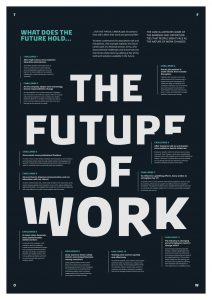In Africa, from parenting to schools to society we have been trained the hard way. Invariably, our world is full of hardworking people; most willing to work, the rest few equipped to let them. It’s those few that become successful and wealthy.

It is good to be hard working. But this is only to a point. After that point, any incremental and exponential supply of personal hard work gets you lesser into profit and farther into the addictive and enjoyable rat race. The problem with the rat race is that even if you win, you’re still a rat. In the scanty table of successful men, they will tell you that hard work doesn’t bring wealth. It’s a myth from the industrial age sold by the upper class to the working class for centuries to keep them productive but suppressed. You know what brings wealth is smart work and not hard work. The smarter we work the wealthier we get. The harder we work the unhealthier we get.

There is a level of hard work needed to start right. During your first sets of years in business or even the corporate ladder, your success is really about hard work what you personally do and the product you build. After those early years in business, your success is determined more by your vision, strategies and the people you hire. Its important to begin to get a lot more done through others. This can be done through delegation and even technology. Now that’s smart work. After the first year, or even the first few months of starting up, stop trying to do everything. Hire smart people, equip and help them put systems in place so that good things happen even when you’re not there.

Like my father says, “ a man will be imprisoned in a room that is unlocked but opens inwards, as long as it doesn’t occur to him to pull instead of push”!

If you knew better, you’d do better. There are variables that can make a man become very successful and that also makes businesses scale. They include Finance, People, Market, and Production Process. But the tough question usually is, which is the hardest to deal with?
People think it’s finance, but leadership and managing people is actually the most important part of running a business to scale. Most businesses can’t scale because most CEOs have been reduced to mere supervisors of their staff as against their two main roles, Strategy and Networking which is responsible for Revenue and Expansion. In other words most CEO and top level executive now major in what is minor. They sweat the petty things and then pet the sweaty things. Leadership is the act of getting things done through others: If you understand this and its structure, you’d do more smart work than hard work. Hard work in the long run is a trap. It may help you make a honest living, but in all honesty, you’d lose the essence of honestly living.

Lets explore the battle of Hard Work Versus Smart Work. I have noticed that in every organization, there are four kinds of people. They are seemingly either
- Dumb and lazy
- Smart and lazy
- Dumb and ambitious
- Smart and ambitious

Now let’s explore their characteristics. The
- Dumb and lazy (usually loyal yet uninspiring and not ambitious)
- Smart and lazy (usually creative)
- Dumb and ambitious (usually cunning)
4. Smart and ambitious: They are all relevant but needs to be involved most appropriately and in a good mix.
The universe isn’t known to reward the hardest working. Activity isn’t productivity.
Even in the animal farm, a lion sleeps 18 hours in a day while a donkey works 18 hours in a day? If it’s by hard work, the donkey should be the king of the jungle.
I am crude talent manager, I believe in getting things done through others. And in trying to achieve this, I look out for good people and I add value to them while around me to get the best out of them too. And over the years, I have come to grade them into the four categories listed above. This refers to either the 1. Dumb and lazy, 2. Smart and lazy, 3. Dumb and ambitious and the 4. Smart and ambitious
Let me break down their pros and cons. When you have
- Dumb and lazy (that is, not ambitious): They will drain you. The good news is, if given simple, clearly stated directions, bumblers will perform day-to-day routine tasks well enough, but not in perfection. Usually because they are not ambitious, they will be content with token raises and will be among your most loyal employees.
- Smart and lazy: They must be continually prodded and they will produce. Because they are lazy but smart, they will find shortcuts to what must be done. So they bring innovation. They have high potential energy but low kinetic energy. With this kind, he lacks the inner fire to turn his brains into personal power, but he has the brains to do well as an advisor. This kind of people can be extremely useful.
- Smart and ambitious: For people like this, keep them busy. Give them harder tasks to do and keep rewarding, celebrating and promoting when they succeed and your organization will see magic. They are also not loyal to you but their needs that have to do with you. So tie theirs to yours.
Success isn’t really by hard work it’s about the smart integration of factors and a hybrid of people that delivers on results. It’s about getting things done. And most time through others. The more you can systematically do this, the better. A key word here is “systems”. A system is a set of processes that can run without you. To stay away of that addictive trap of hard work, lets look at a few key systems that you should think about creating in the early stages of your business.
You will need to craft a big picture of what you want most. And then break it down through structure of what must be done and the tools you’d need. Keep those pictures in mind and closer each day by engaging yourself with it, drawing closer to things that draws you closer to it. At this stage, hard work is key. But as your business grows, you’ll need to build smart work and smart systems and processes that can be automated as much as possible. For your business, you will need to build production centers with efficient distribution systems. You will need to develop inventory systems, marketing systems, and customer support systems. To stay ahead of competition you need to develop a research and development systems, and for your efficiency you’d need to create accounting and human resource systems, and many others.
Systems are rules, policies, and procedures that trained individuals can repeat as your company grows and run independent of you. On a higher level, you must connect with those who have walked the paths ahead of you. You will need mentors and a board of advisors. They will supply you with not just advice but the right mindset and spirit. When this happen, for sustainability and relevance, you will also need to invest in the future and posterity by having mentees. Later in life, you’d be grateful, not just for hard work but smart work. I look forward to working with you through that journey.
Eizu, ©Hexavia!
Strategy. Business StartUps and Corporate Restructuring Consulting
T: 08035202891
Uwaoma Eizu is the lead strategist at Hexavia! He is a graduate of Mathematics with two MBAs and over a decade of experience working with startups and big businesses. His core is in building startups and in corporate restructuring. He is also a certified member of the Nigerian Institute of Management, Institute of Strategic Management of Nigeria and the Project Management Institute, USA. By the side, he writes weekly for the BusinessDay newspaper.





1 comment
Hexavia has been impacting lives professionally and growing businesses through strategic guidance and organizational structuring.